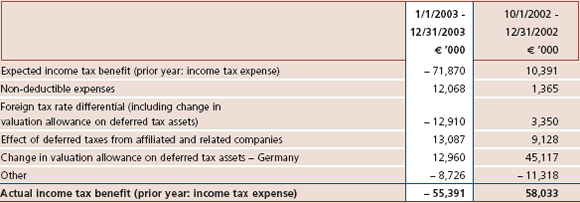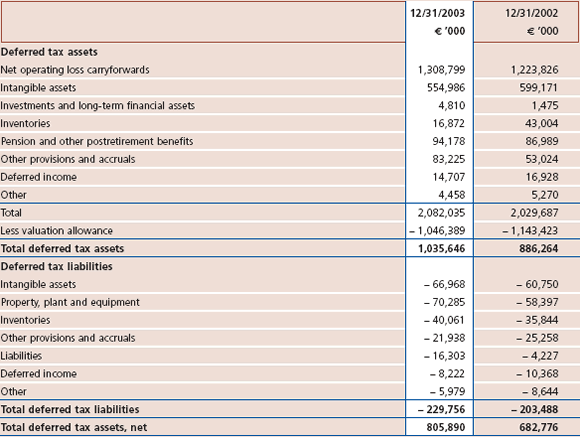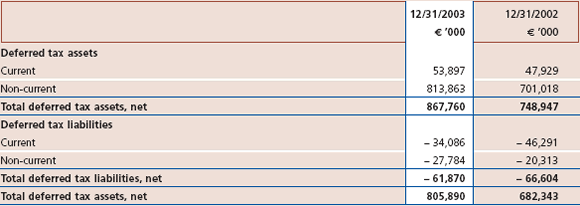Income taxes contain the following components:

Since fiscal 2001/2002, a uniform corporation tax rate of 25% and the so-called half-income system of taxation have applied to German limited companies. Under Germany’s flood victims’ solidarity legislation of September 19, 2002, the rate of German corporation tax for fiscal 2003 was raised on a one-off basis by 1.5 percentage points to 26.5%.
At December 31, 2002, German companies therefore calculated deferred taxes for fiscal 2003 based on the corporation tax rate of 26.5% (28% including the solidarity surcharge) applicable for this year. German companies’ computation of deferred taxes was thus based on the pertinent tax rates of 26.4% and 28.0% and the relevant trade tax rates of 13.3% and 13.0% respectively. The calculation of German companies’ deferred taxes was therefore based on a total rate of 39.7% and 41.0% respectively. The impact of this tax increase due to the flood victims’ solidarity legislation, which was limited to one year, was not of material importance. At December 31, 2003, German companies are calculating their deferred taxes based on an overall tax rate of 39.7%.
Deferred taxes are computed using national tax rates which, according to the enacted law in the respective countries at the balance sheet date, will apply on the date on which the timing differences are likely to be eliminated or net operating loss (NOL) carryforwards are likely to be utilized. The following breakdown of tax expense for fiscal 2003 is based on an overall tax rate of 39.7% and reconciliation to the effective tax rate of 30.6%:

Deferred tax assets and liabilities are recognized for all temporary differences between the amounts reported in the tax accounts and those in the U.S. GAAP financial statements included in the consolidated accounts. Deferred taxes are also recognized in relation to various consolidation measures. Furthermore, deferred tax assets are recognized for losses carried forward. If deferred tax assets are unlikely to be realized, a valuation allowance is reported. Deferred tax liabilities on retained earnings at foreign subsidiaries of mg technologies ag were not established, because the vast majority of these earnings are not intended to be distributed in the future either, but constitute a permanent investment. The calculation of the deferred taxes not reported would have involved a disproportionate amount of time and effort.
The primary components of deferred tax assets and liabilities and the related valuation allowances result from adjustments in the following items:

Net deferred tax assets and liabilities are further broken down by current and non-current portions as follows:

At December 31, 2003, the mg Group had corporate tax net operating loss (NOL) carryforwards of €3,175 million (prior year: €2,970 million) and German trade tax NOLs of €1,943 million (prior year: €1,411 million). The NOLs of German companies have an unlimited carryforward period. The losses of foreign companies can usually only be carried forward for a limited period. A deferred tax allowance of €1.036 billion (prior year: €1.138 billion) has been established against the total NOLs. The income taxes paid by the companies reported as discontinued operations amounted to €9.945 million in 2003 (prior year: minus €1.402 million).